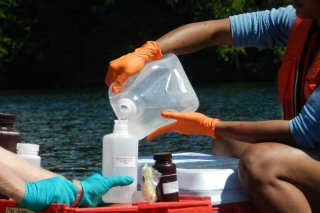National Aquatic Resource Surveys in the Great Lakes

One of the primary tasks for the EPA scientists in the Great Lakes Toxicology and Ecology Division (GLTED) is to conduct research to support the National Aquatic Resource Surveys (NARS). The NARS are collaborative assessments carried out by EPA offices, states, and tribes designed to assess the quality of the nation's coastal waters, lakes and reservoirs, rivers and streams, and wetlands using a statistical survey design. EPA reports on the condition of the nation’s water resources using the data collected from surveys as a requirement of the Clean Water Act.
On this page:
- National Coastal Condition Assessments in the Great Lakes
- Research Supporting NCCAs in the Great Lakes
- Indicator Research at EPA
- Related Research and Resources
National Coastal Conditions Assessments in the Great Lakes
EPA Great Lakes researchers support all the national surveys and play a vital role in the National Coastal Condition Assessment (NCCA) in the Great Lakes, which occurs every 5-years.
Great Lakes researchers develop and test sampling designs and indicators to expand the use of NARS by state resource management agencies. EPA Great Lakes research aims to improve the abilities of resource managers to assess water quality and biotic integrity, monitor changes in conditions over time, and to restore ecosystem services.
Research Supporting NCCAs in the Great Lakes
EPA researchers better meet the needs of environmental managers and other stakeholders by improving survey design and the ability to monitor key environmental indicators.
Indicator Research at EPA
EPA research improves the assessment thresholds for indicators. Thresholds are indicator values or individual metrics that tell whether conditions are good, fair or poor. Thresholds must be relevant to the waters being assessed. For example, Lake Erie water quality would always appear “poor” if assessed using Lake Superior’s thresholds because Lake Erie is naturally more eutrophic. The thresholds are regularly reviewed and improved, as science improves our understanding of ecosystem conditions
EPA researchers are developing new technologies and generating new metrics to improve existing indicators. For example, EPA researchers use video of the lake bottom to improve the information available for the assessment of benthic communities (bottom-dwelling species). Another research initiative is improving measurements related to algal nutrient consumption, which can help environmental managers identify where harmful algal blooms are likely to occur.
EPA researchers and collaborators are also exploring how genetic markers may be used to assess the vulnerability of coastal waters to invasive species.
Click on the pages below to learn more about types of indicator research:
